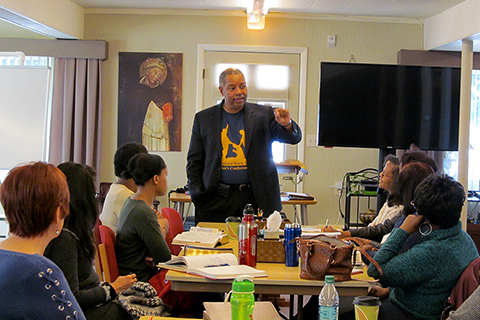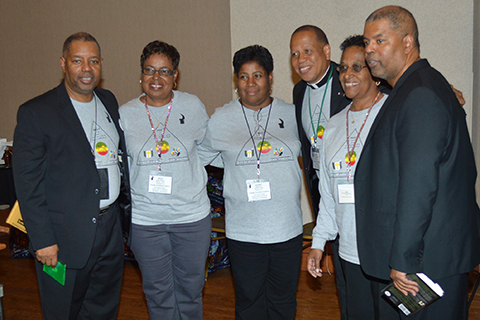A Q&A with Father Chester Smith SVD
Divine Word Father Chester Smith co-founded the National Black Catholic Men’s Conference almost 20 years ago. He is an original member of the Bowman Francis Ministry Team and continues to organize the conference today. Father Smith and his identical twin brother are the first African American twins to both become Catholic priests.
Father Smith recently made time to talk with Director of Public and Media Relations Theresa Carson after participating in a liturgy and reception in the Diocese of Buffalo to commemorate Dr. Martin Luther King Day.
How was your event on Dr. Martin Luther King Jr. Day?
Beautiful and informative. The people of Buffalo have been celebrating Dr. Martin Luther King Day for 34 years. It was a spiritual event that honored Dr. King and emphasized that he was a man of service. You can celebrate the holiday, but you should include service. He urged us to be of service in a church community and care for those who are poor.
Young people can be of service to Dr. King by visiting the elderly, a homeless shelter or a prison, by being a part of a community service event. It starts with honoring this man of service—that we be likewise.
What are your thoughts as you reflect upon the event?
I don’t know Buffalo that well, but I think people were looking for a message that would inspire them to be about Dr. King’s dream. It’s not that they haven’t heard that message before, but with everything that is happening in our country, people are looking and trying to witness people who are connected with Dr. King’s message. I think people are looking for ideas and messages no matter what race they are, a positive message to implement a new vision.
How is Dr. King’s message relevant more than 50 years later?
We still face issues that get in the way of Dr. King’s dream. We have to rise and deal with the anti-Semitic attacks, homophobia, and economic inequality. And we have so much hatred in the land. If Dr. King were alive today, he would say to everyone, we have to love our enemies. We have to fight against hatred and those things that divide us.
How can Catholics have an impact?
As a Catholic Church, we must be unified. In Buffalo after Mass, everyone came together—White, Black, Hispanic – for a dinner. People were talking among themselves about the sermon, the liturgy and continuing Dr. King’s dream. We talked and listened to each other. Dr. King probably was looking down from heaven and saying that’s a good thing. People of different races and ages talking about issues of the day.
What are you seeing as you travel and speak across the nation?
There’s a lot of apathy and hopelessness. Dr. King would be trying to stop the violence, all the shootings in the community. People are looking for people with a positive message. They want strategies to take back to their communities, homes and parishes. They needed a positive message. That’s one of the reasons why we continue to organize the National Black Catholic Men’s Conference every year.
What’s the focus of the conference?
We deal with some of those same life issues at the men’s conference. We let them know that as Black Catholic men their lives count. In Louisville in October, we will emphasize that they are men of God and their lives count. We help them fulfill that quest for meaning by looking at the subjects of manhood, married life if they’re married and what it means to be a priest or brother or deacon.
How do you get the participants involved?
We have workshops that focus on manhood, married life and service to the community. We’ll even have workshops for the boys to consider a religious vocation. We want the young men to know that they can choose any career. Whatever career path they choose, we want them to be connected to God.
How do you address the concerns of the younger generation?
We also have a lot of young adults who have been at the men’s conference; they are challenging us to have workshops that pertain to the sacraments. Because of lot of them don’t see the sacramental life emphasized in their lives. They see it Sunday at Mass, but they think the Mass is boring; they don’t want to come.
We’re going to tackle it by looking at the sacraments of the Eucharist and reconciliation. To really look at those two sacraments so they can really get something from it—from a theoretical level so they can utilize it on the practical level.
People tend to go to confession once a year before Easter. I’ve seen this over the years. That’s not the case for the men who attend the conference. We offer the sacrament of reconciliation before 7:30 Mass each morning. The men start lining up at 7 a.m., waiting for the priest for confession. There are so many men that we have to stop in order to start Mass on time and tell them when we’ll have confessions again.
What impact has the National Black Catholic Men’s Conference had over the past decade?
The experience resonates with the participants long after the conference. I met one woman who has been a member of one of our parishes for 35 years. She encouraged her son in Los Angeles to attend last year’s National Black Catholic Men’s Conference. He did. She said he is so much better now. He talked with his priest and is planning to come to the conference in Louisville. He’s fired up and is active on committees in church. Before the conference, he was thinking about joining a mega church but instead is staying in the Catholic Church. He’s even thinking about becoming a deacon.
If you could say something to each participant as he leaves the conference, what would it be?
I would say, “Your life counts. Your life matters and no matter what society says in terms of your life, it matters. At this Louisville conference, we will continue to build a legacy.” We provide workshops that remind the men that their lives matter so they can leave a legacy for their children. If they don’t have children, they might be godfathers. This conference is going to help them have meaning so they can leave a legacy. People will say he did something while he was at this church. That legacy will be passed on to younger boys and the whole community.
How do you begin to address some of the socioeconomic disparities in our world?
As SVD ministers in the Black community, I think we’re going to have to move into the area of social justice even more. At the conference in Los Angeles, we offered workshops on voting. We know that black women outvote us. We have to register to vote. It’s not about being a Democrat or a Republic; it’s about knowing what our people went through for us to be able to vote.
 As SVDs, we need to be more prolific in our presentations and do more writing. We should challenge the people to be more involved in the political arena because that’s one way that we can liberate our people and elevate the respect that society has for us as human beings. We need to talk about socioeconomic issues. The poor get poorer.
As SVDs, we need to be more prolific in our presentations and do more writing. We should challenge the people to be more involved in the political arena because that’s one way that we can liberate our people and elevate the respect that society has for us as human beings. We need to talk about socioeconomic issues. The poor get poorer.
Join Black Lives Matter. Understand why Black Lives Matter exists. Understand social injustices happening in the communities. Be proactive and do something about it. I think what’s happening is that we have the knowledge, but it’s not trickling down to the people in the communities. Be more active in presentations, writing and programs.
The Society of the Divine Word has a rich history of collaboration with African American communities in fostering social justice and equality. What do you project for the future?
Dr. King talked of the beloved community. He said we have to deal with the social inequities in order to be a community of love. When people are so poor that they don’t have food on the table, you have to be able to teach that person.
Being a person of love is so important. I feel that’s what Dr. King’s message was all about. You don’t defeat your enemy by killing more than they do; you win by being a beloved person in the community.
Share that love with everyone who comes within your presence. Dr. King was a tactician who knew that love would win. Be in love with yourself and Christ to overcome any negative event. Have that faith and love for God in order to overcome these obstacles that are in the communities.
How have you seen the Society of the Divine Word foster those values?
We do it through Bible studies. Father Bob Kelly and St. Anselm parish in Chicago runs a food pantry and the Brother Jim Fisher Initiative. What better way to stop the crime than by teaching young people to love themselves? Stop hating yourself. Stop trying to find love within a gang. All they want you to do is kill someone, be a violent person. Teach them the non-violent theories of Dr. King.
We have a legacy that was built by the early German priests who built the seminary in Bay St. Louis and the one in Greenville, Mississippi before that. In the early 1920s, the KKK burned the school in Greenville to the ground. Then the missionaries moved it to Bay St. Louis. They kept on.
What is your hope for the future?
Those early pioneers built that legacy and the priests who came after, especially the Black priests: Father Jerome Ledoux, Bishop Curtis Guillory and Bishop Joseph Francis.
They built a legacy. Bishop Joe Francis was the principal author of the United States Conference of Catholic Bishops’ 1979 pastoral letter “Brothers and Sisters to Us.” He called racism a sin. He challenged the people to deal with racism. Most Catholics aren’t familiar with that pastoral letter. What better way to deal with racism than to teach “Brothers and Sisters to Us,” first to the people in the parishes and then to participants at the men’s conference?
I used some of Dr. King’s concepts when I went to Houston recently for a confirmation retreat. I talked about the concept of the Holy Spirit and the seven principles of Kwanzaa—how the Holy Spirit can affect their lives. Once they’re confirmed in the Spirit, once you instill those practices and concepts, not only will it make them better people but also better citizens and better Catholics. These are the people who will be leading the nation one day.